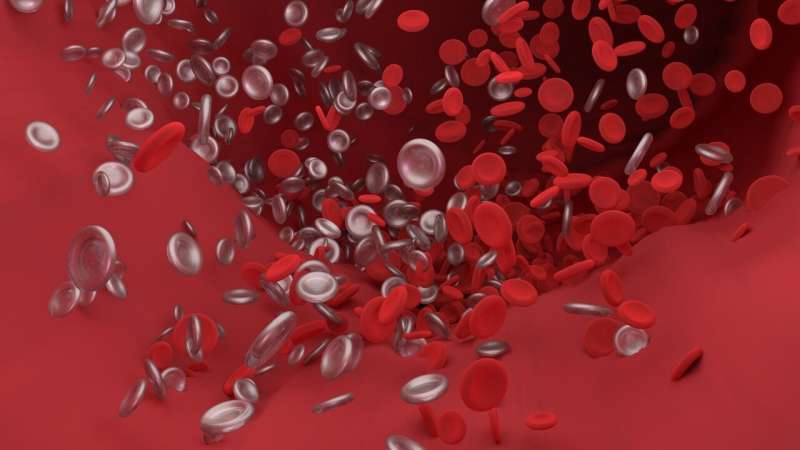This article has been reviewed according to Science X's editorial process and policies. Editors have highlighted the following attributes while ensuring the content's credibility:
fact-checked
peer-reviewed publication
trusted source
proofread
Women with gene mutation give new insight into blood clot risk

New research from Queen Mary University of London, published in iScience, shows an increased risk of blood clots in women who have any combination of a particular gene mutation, estrogen use, or common medical conditions—specifically: obesity, high blood pressure, high cholesterol, and kidney disease.
Women with the Factor V Leiden (FVL) gene mutation who had been prescribed estrogen had more than double the risk of blood clotting compared to women who did not have this mutation. And almost 20% of the women who carry FVL, were prescribed estrogen and had two medical conditions suffered a blood clot. The presence of the FVL gene made a substantial difference to risk, with only around 5% of women taking estrogen and having two conditions suffering a clotting event.
The study also found that a woman with obesity, high blood pressure, high cholesterol, and kidney disease—which is not uncommon in a clinical setting—had an eight times greater chance of blood clotting compared to a woman with none of these conditions. This amounted to roughly one in every six women with the four conditions in the study suffering a blood clot. Three medical conditions meant a five times greater chance of blood clotting, and two medical conditions meant a two times greater chance.
One in three women who had the FVL gene mutation and three of the medical conditions examined also suffered a blood clotting event.
The researchers examined the health data of 20,048 British-Bangladeshi and British-Pakistani women from the Genes & Health project, a large community-based genetics study. While estrogen use, FVL, and common medical conditions are all known risk factors of blood clots, studies have not looked at the combined risk of these factors together on blood clot prevalence.
Women are commonly prescribed estrogen, both through oral contraception containing the hormone and as part of hormone replacement therapy to replace the estrogen that their body stops making during menopause.
Dr. Emma Magavern, lead author from Queen Mary University of London, said, "Many women will take estrogen at some point in their lifetime. Overall, this is very safe and there are far more positives to taking it than negatives when it's prescribed. But these women may not be aware of the combined risk of their genetics and overall health and how it affects their risk of developing a blood clot, which could be life-threatening for some individuals.
"It's important that women have all the information they need to make an informed choice. While our results are important for women everywhere, they are especially relevant for South Asian women with multiple existing health conditions."
Professor Sir Mark Caulfield, from Queen Mary University of London, said, "Our study gives a more complete picture of blood clotting in Bangladeshi and Pakistani communities who have previously been underrepresented in research.
"Genetic testing of the FVL gene mutation could give a clearer sense of someone's personalized risk of this potentially fatal complication if they were prescribed estrogen."
More information: Emma F. Magavern et al, Factor V Leiden, oestrogen and multimorbidity association with venous thromboembolism in a British-South Asian Cohort, iScience (2023). DOI: 10.1016/j.isci.2023.107795 , dx.doi.org/10.1016/j.isci.2023.107795





















